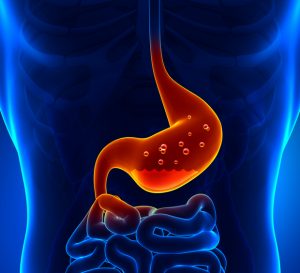
When the cause of gastroparesis is unknown (in most cases), the condition is referred to as idiopathic gastroparesis. When the condition develops in diabetics, it is known as diabetic gastroparesis.
Patients recovering from surgery can develop gastroparesis as well.
There is currently no cure for gastroparesis, but there are treatment options available to help ease the condition. Treatment is usually a combination of dietary changes and medications.
Causes and symptoms of gastroparesis
As mentioned, in most cases, the cause of gastroparesis is unknown. Gastroparesis is believed to be triggered by a problem with the nerves and muscles that control the stomach emptying. Nerve damage and muscle malfunctioning impact the motility, so food doesn’t completely leave the stomach.
Other possible causes of gastroparesis include taking certain painkillers, having Parkinson’s disease, scleroderma, and amyloidosis (a group of rare diseases caused by deposits of abnormal protein in tissues and organs).
Symptoms of gastroparesis include:
- Feeling full soon after eating
- Nausea
- Loss of appetite
- Weight loss
- Bloating
- Abdominal pain or discomfort
- Heartburn
Complications and risk factors for gastroparesis
Risk factors for gastroparesis include having diabetes, hypothyroidism, or infection, recovering from abdominal surgery, taking certain medications (especially those that slow down stomach motility), undergoing certain cancer treatments, and having scleroderma or nervous system diseases like Parkinson’s disease and multiple sclerosis.
Diagnosis and tests for gastroparesis
A combination of several tests is required to properly diagnose gastroparesis, including upper gastrointestinal endoscopy, CT enterography, and MR enterography, X-rays of the gastrointestinal tract, gastric emptying study, and a breath test measuring the amount of gas produced after drinking sugar water and released through the breath.
Treatment options for gastroparesis
The primary mode of treatment for gastroparesis involves changing your diet. Diet changes for gastroparesis include eating smaller meals more frequently throughout the day, chewing your food thoroughly, eating vegetables that are well cooked as opposed to raw, avoiding fibrous food like broccoli or oranges, choosing low-fat foods, consuming pureed food or soups, drinking adequate amounts of water with each meal, exercising gently after each meal, and avoiding carbonated beverages, alcohol, and smoking.
Drugs for gastroparesis include medications to stimulate the stomach muscles and medications to control nausea and vomiting.
In some cases, surgery is required to treat gastroparesis if the patient is unable to tolerate food and liquids. Doctors may recommend a feeding tube to be placed in the small intestine, or a gastric venting tube to help relieve pressure from gastric contents.
Feeding tubes are temporary and are fed through the nose into the small intestine. They are used in severe cases of gastroparesis.
Your doctor will determine the best mode of treatment depending on the severity of your condition.